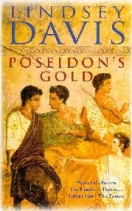 Poseidon’s Gold is somewhat focussed around relationships within the Falco family. It also reveals Falco’s determination to make an honest woman of Helena Justina and bring no dishonour to her family, by marrying out of station-in-life. Due illegal trading by Festus and probing by centurions of his Legion, Falco is charged by his mother to protect the good name of his family; he also takes up the task of protecting his Father’s good name as an auctioneer against the overweening possessiveness of the art collectors, who seek to ruin him, and that, feloniously.
Poseidon’s Gold is somewhat focussed around relationships within the Falco family. It also reveals Falco’s determination to make an honest woman of Helena Justina and bring no dishonour to her family, by marrying out of station-in-life. Due illegal trading by Festus and probing by centurions of his Legion, Falco is charged by his mother to protect the good name of his family; he also takes up the task of protecting his Father’s good name as an auctioneer against the overweening possessiveness of the art collectors, who seek to ruin him, and that, feloniously.
Values and Virtue in Poseidon’s Gold
Festus, Falco’s elder brother by 8 years, was trading from his military assignments, and their father Geminius, was his partner. Festus was the finder; Geminius was the financier, except upon one occasion when the legion raided their savings bank. Festus shipped statuary, giant urns and vases from his Forts back to Rome by sea. He also sent linen, purple dye, cedar logs, etc. Unbeknownst to all, he also moved several antique statues and plints of marble to Rome.
The shady world of art-dealing. Falco’s father, Geminius, deals with goods from homes, and importers. He can spot fakes, and indeed, moves fakes to sale, declaring that duplicates can bring in just as much income as originals, and cannot be spotted either, except by another professional. Geminius has repairmen to repair cracks, handles, and even, upon demand, make forgeries. Creation is a delicate process, deceit is a fine art, reflects Falco.
Frequenters of Gemina’s auctions were art connoisseurs. Two of these connoisseurs, Carus and Servia, had a private art gallery and employed thugs to recover their alleged “payment” to Festus from Geminius. When Falco and his father visited this private gallery, Falco reflected to himself, We had come to a house where the need to possess hung in the air as strong as a sickness.
Another part of this environment was interior decoration of homes, with plaster, and frescoes along with wall and roof murals. Painters are portrayed as perpetually drunk, of little intelligence or culture, and satisfied with wine, women and song. The sculptor Orontes and his model Rubinia encapsulate this, along with the drunken painters Varga and Manilus. The description of their living quarters was revolting.
The transmission of ‘culture’ and learning. The narrative opens with Falco being pursued by his best friend Petro for a murder in Flora’s capuona. This is because the local Judge, Marponius, was taken to the murder scene by Petro. It was a horrific scene. Helena Justina is subsequently arrested on a technicality and Falco goes to the Judge’s house to investigate. Marponius was a dull thug from the middle class who made himself rich by selling scientific encyclopaedia’s to New Men (freed slaves).
The “encyclopaedia’s” were simply expensive papyrus scrolls copied with gall ink and had highly scented sandalwood endpieces. They were sold by weight, and the New Men (and perhaps, daring women) had them read out to them by literate slaves. Marponius supplied the literate slaves with refined voices, too.
Fake learning, fake culture, and the ambience of forgeries. What is true in such an environment? Perhaps it is the possession of virtue, and living to make an honest person out of the other. Respectability and culture is what the Roman society surrounded itself with, in the form of plaster work, frescoes, statues, antiques, imported furniture and fittings, all these external habiliments and fitments of ‘learning and culture’,
On the other hand, virtue is from within. Virtue is the self-evident respectability and perhaps, gravitas surrounding a person, when one lives with the voice of conscience and guides action in accord with its voice. Certainly the path of true love and virtue are torturous for Helena Justina and Falco; in the narrative Falco freely admits he lives in squalor and not on the illicit earnings from the sale of his deceased brother’s assets. Virtue need not surround itself with external habiliments of class and culture in order to live a life filled with peace, truth, love and beauty.
Poseidon’s Gold is the name of this narrative, inferring that the gold (which all rapacious and greedy persons seek in the form of currency, metals that can be traded with or investment maintaining antiques which appreciate in value over time) is at the bottom of the ocean guarded by the God of the waters, very Poseidon himself. But what of the gold of virtuous living. Perhaps this is deep within the ocean of human life, at the very heart of things, the heart filled with love.
The novel ends with Falco and Helena Justina by the Caelimontana Gate; Domitan has rejected Falco’s request to raise him to equestrian rank so they allow their love to be the witness to their betrothal.
Truth is what we speak,
Right Conduct is what we practise,
Love is what we live,
Peace is what we give,
Non-violence is the fruit.
![]()

